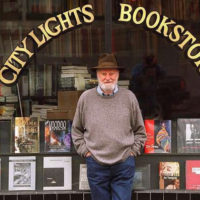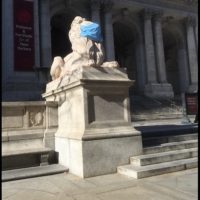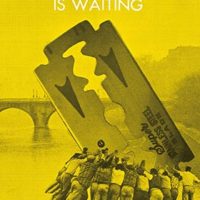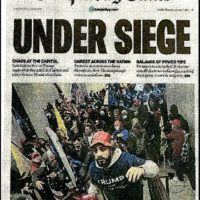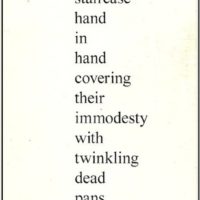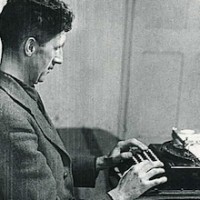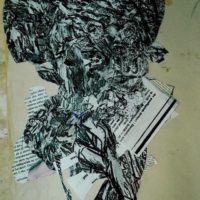A literary era passes. It was already past, yet it still has influence. Maybe the biggest. Because ArtsJournal was down yesterday—I know not why—I couldn’t post this. The world didn’t miss it. My account is minimal in the scheme of things but here ‘tiz anyhow, excerpted from ‘My Adventures in Fugitive Litrichur.’
Lawrence Ferlinghetti Dies at 101
Gary Lee-Nova: ‘Oblique Trajectories’
A survey exhibition of the artist’s work over more than four decades.
The exhibition at the Burnaby Art Gallery in Burnaby, B.C., Canada, will run until April 18, 2021.
The Library Is Closed
…and thoughts come in verse: ‘The stone lion at the gate / wears a mask like mine. / This is where I used to wait / for books that bind / that kept my mind at ease— / I crack them as I please. / Now I hurry home . . .’
‘Four-mile walk / double masked / fogged-up glasses / gloves and hat— / I’m a walking mummy / in deserted streets.’
The Sleep of Dreams
A contemporary artist visualizes an idea by the 17th-century ‘father of modern philosophy.’
City of Science
Truth and Lies: Covering COVID-18
How do journalists cover a crucial and complex topic like COVID-19 in this era of polarization and soundbites? Besides the challenge of quickly translating life-and-death medical and technical information to a broad audience, how do they guard against misinformation, lies, and the politicization of science? How can they dig through the many layers to bring lifesaving facts to the public?
Riding the Zoom Wagon
‘Journalism in a Time of Crisis’
The New York Review of Books will present a discussion about the ways contemporary journalism has addressed moments of political and social crisis. The program, Journalism in a Time of Crisis, is scheduled for Feb. 24 at 7:30 p.m., featuring Justine van der Leun, Howard French, Elizabeth Bruenig, Mark Danner, and Darryl Pinckney.
emmett williams: ‘universal truths’
from ‘selected shorter poems 1950-1970’ ‘universal truths / shouldn’t be / all that hard / to find . . .’
Moloko Print
Two New Books of Poems in Bilingual Editions
One by yours truly, “Your Obituary Is Waiting.” It’s a collection of “deformed sonnets,” with German translations by Gregor Pott and “flypaper collages” by Norman Ogue Mustill as counterpoint. The book design by Robert Schalinski, the paper, and the print quality are to die for, no pun. The other is “The Return” by William Cody Maher, also bilingual, with German translations by Walter Hartmann and photos by Signe Mähler, designed by Ralph Gabriel. And again the quality of the production is stunning. Furthermore, in a joint production, Moloko and Sea Urchin Editions have released “The Ex-Terr Poems” by Ed Sanders with his drawings, in an English-only edition, designed by Anneke Auer. I haven’t seen the book itself but I would bet the quality of the artifact matches the others.
Let’s Talk About Literary Exposure
Some would call it visibility. If you’re talking books, how about millions upon millions of Youtube views for a reading from Supervert’s ‘Necrophilia Variations.’ A dozen years ago when that video had two million views, I called it “viral reading.” Three years later, on Dec. 30, 2015, the video had 18.6 million views. Today it has some 28 million views. So what has this meant for selling the book?
Jim Haynes, RIP
Brad Spurgeon memorializes him: “End of an Era, but not of a Philosophy of Life.” I never met Jim. But he was extraordinarily welcoming when we corresponded by email about the strange case of Orwell’s typewriter.
Remember These Headlines
These headline writers got it right.
GC CUNY at the Center of the Conversation
Peter Baker & Susan Glasser on James A. Baker III, with Kai Bird
“For a quarter-century, from the end of Watergate to the aftermath of the Cold War, no Republican won the presidency without the help of James A. Baker III or ran the White House without his advice. Now two major political journalists, Peter Baker (of The New York Times) and Susan Glasser (of The New Yorker) have written ‘The Man Who Ran Washington,’ a definitive, page-turning biography of the power broker whose impact was unmatched when Washington ran the world and who influenced America’s destiny for generations. The authors join in a discussion with Kai Bird, executive director of the Leon Levy Center for Biography.”
Let’s Begin the New Year . . .
. . . with an old poem by a late friend: “buster / duchamp / and / marcel / keaton / walked / down / an / exploding / staircase / hand / in / hand / covering / their / immodesty / with / twinkling / dead / pans / did / marcel / keaton / and buster / duchamp”
‘Burroughs and the Dharma’
William S. Burroughs was not a Buddhist: he never sought or found a “Teacher,” he never took Refuge, and he never undertook any Bodhisattva vows nor—for that matter—did he ever declare himself a follower of any one faith or practice.. He did not consider himself a Buddhist. But he did have an awareness of the essentials of Buddhism, and in his own way, he was affected by bodhidharma.
Twin Engines of Misrule
Sometimes my tireless staff of thousands looks back and sees a blogpost that demands to be reposted. This one from Dec. 17, 2004 — 18 years ago next week, imagine that: “When 1984 came around smack in the middle of the rose-tinted Reagan era, many in the commentariat had a field day noting that George Orwell, for all his genius, had overstated his case. The future he’d warned of in ‘1984’ simply hadn’t come to pass.”
On Account of the Pandemic . . .
VACCINE: It’s not a matter / of knowing we will end— / though it’s no fun, / that is not the matter— / everything will end. / The matter is, / there’s no cure for that. / When death is deleted / by coding—digital, / genetical, biochemical— / whatever combination / it takes—something else / will provoke us. Freud / thought it perpetual.
GC CUNY at the Center of the Conversation
Biden Chronicler Evan Osnos on the 2020 Presidential Election
In his new book, “Joe Biden: The Life, the Run, and What Matters Now,” Evan Osnos draws on nearly a decade of reporting for The New Yorker. His portrait of Biden and what his election means for the nation. is based on lengthy interviews with Biden, as well as conversations with President Barack Obama, the Biden family, his advisers, rivals, and opponents.

